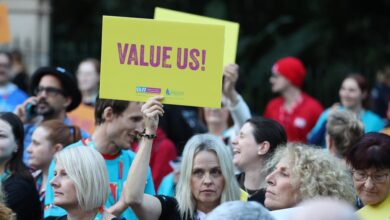Researchers explore how confidence can affect performance for CALD nurses

Communication is the bedrock of nursing and for nurses from CALD backgrounds – one-third of nurses in Australia were born overseas – this can be sometimes challenging.
Researchers at the University of South Australia’s School of Nursing and Midwifery believe that lack of confidence in communication skills can adversely affect clinical practice in CALD nurses and have looked into ways in which we can improve the confidence of this cohort when communicating in English as a second language.
The research, An intervention to improve confidence in nursing students from culturally and linguistically diverse backgrounds who speak English as a second language: a pilot study, developed a method of improving a nurse's self-confidence through immediate, personalised feedback.
Lead researcher Alanna Piotrowski, who was a UniSA Master of Nursing Student, spoke with Nursing Review about her work.
NR: Alanna, what inspired you to tackle this issue?
AP: During my time as a registered nurse and midwife, I have had several opportunities to work with students while they are undertaking their clinical placements. Thanks to my additional postgraduate study in nurse education, I try to see opportunities to further enhance the students’ experiences while I am preceptoring them. As is the case for most nurses and midwives, I have seen a rise in the number of students from non-English speaking backgrounds come through our university systems and into our hospitals as students, and then also in their postgraduate programs and future careers.
Over time, I have had discussions with students from culturally and linguistically diverse backgrounds and have tried to understand why they think they struggle as much as they do in the workforce. One student in particular explained that previously, nurses and educators hadn’t taken much time to explain language and cultural norms to her. She could speak English, probably better than those of us born in Australia, but she often struggled to understand and recognise body language, sarcasm and idioms.
Students also acknowledged that in the past, nurses were seemingly frustrated with their lack of understanding, and often ‘took over’ the task just to get things done quicker, which meant the student didn’t have the chance to talk to the patient themselves and develop their skills. Additionally, students mentioned nurses who had made them feel as if they were asking too many ‘silly questions’ and causing more problems, so over time they learnt to stay quiet and stop asking for clarification.
I realised that students’ confidence levels are impacted by the way they are treated by nurses, medical staff, educators, patients and family members, and even though they may have a high level of theoretical knowledge, their confidence is shattered which leaves them second guessing themselves and stammering over tasks, especially when needing to verbalise their thoughts and knowledge.
In my unit, delivering post-operative education to patients before discharge is unavoidable, and ensuring the patient receives and understands this information is imperative. All the information we provide verbally to the patients is written down and given to them on discharge, so the role of the nurse is to ensure this information is heard and understood, and to provide the chance for patients to ask questions and seek clarity.
I could see that students’ confidence levels had been affected by their past experiences with nurses and educators, whether in the university or hospital setting. I thought that if a student was provided the opportunity to receive some feedback, both positive and negative, about their encounters with patients, they would have the opportunity to not only act on their faults, but also celebrate the positive aspects of their communication skills.
Having good communication skills is essential for nurses, and it is up to us, as medical professionals and educators, to foster not only their communication skills, but also their confidence levels.
Tell us about the study itself, who was involved and what did they do?
I was assigned two supervisors from the university to support my minor thesis journey – Dr Angela Kucia and Mr Aaron Farquharson. I recruited seven students from the undergraduate Bachelor of Nursing program at the University of South Australia.
The data collection occurred over three days on campus at the University of South Australia. Each participant attended separately. The role of the patients in the scenarios were fulfilled by my supervisors as well as friends who volunteered their time to act in the data collection.l Each participant attended for approximately 30 minutes and then no further action was required from them.
During the data collection process, I watched the participants as they undertook the first scenario and made personal notes on their words, actions and behaviours when interacting with the ‘patients’. After the scenario was complete, I immediately had a conversation with them and provided feedback, both good and bad, about what I had observed. The participants then moved on to the second scenario before completing the post intervention questionnaire independently.
How did you measure confidence? And how did you improve it?
Participants completed a questionnaire before and after the intervention. This questionnaire covered 11 aspects of communication that I thought were integral to how nurses communicate with patients and other health professionals. The questionnaire asks the participant to rate how confident they are when doing various tasks and is measured on a Likert scale, from 1-10, with 1 being minimally confident and 10 being extremely confident.
Several previous studies have used communication assessment tools during their research, but none were able to be used as an exact replica for my own study. I took guidance from the format, wording and aspects of these tools, and developed my own. Elements included preparation, greeting, setting the scene, professionalism, establishing rapport, maintaining privacy and confidentiality, active listening, tone and cadence of speech, use of medical jargon and terminology, and closure.
At the conclusion of the intervention (two scenarios and feedback provision) the participants completed an identical questionnaire with the aim that there would be a change (positive or negative) in their confidence levels.
The integral part of the study was the intervention – provision of immediate and personalised feedback following the first scenario. When providing this feedback, I endeavoured to address the elements covered in the questionnaire and made sure to identify positives and well as areas of improvement for each participant.
When discussing aspects they could work on, I made sure to talk about strategies they could use to improve their skills and asked questions about what (if anything) they had done in the past to make improvements.
During this time, I also had discussions with each participant about any previous experiences that had an impact on their confidence levels in the hope that talking about these experiences would help to identify any further areas they could improve in.
It was important to provide individualised feedback specific to behaviours I had witnessed during their interaction with the patient in the scenario. It’s not always possible to provide feedback when students are on placement in a timely manner, and having a quick conversation in the nurse’s station, or worse – at the patient’s bedside – is hardly ideal and conducive to positive improvements.
All participants involved in this study showed a statistically significant improvement in their perceived self-confidence after the provision of immediate, personalised feedback about their communication skills. How could we put this work into a medical setting?
The main thing I hoped to achieve during this research was identifying if an individualised and personalised approach to feedback makes a difference.
In the case of the seven participants in this study, it did. I think we can bring this into the healthcare setting by identifying these nurses (as undergraduates and postgraduates) that are from CALD backgrounds who may need extra support as they learn the ways of the Australian language, our behaviours and cultural norms.
These nurses can then be offered additional mentorship and one on one support where they can continue to have the opportunities to receive this immediate and personalised feedback on a regular basis.
However, I do think a really important aspect is the willingness on the part of the participants. All participants in our study came forward on their own terms – they identified themselves as someone from a CALD background who wanted the opportunity to improve their own confidence levels around their communication skills.
This willingness and receptiveness to feedback is integral to see improvements. For this reason, it is important that we do not look at this as a blanket rule that all nurses from CALD backgrounds need additional mentorship, merely that we develop a program than enables them the opportunity to have additional mentorship if they feel it is something they would benefit from.
What are the future implications for CALD nurses?
The main implication I see in my daily practice is that we (as nurses and healthcare professionals) need to realise that confidence levels have an impact on our theoretical knowledge and our ability to perform.
Self-doubt is likely something we have all had to deal with at one point in our career, and for CALD nurses it is no different. We need to understand that the language, behaviours and idioms of the Australian people are different to what people may have grown up with in their home countries.
The Australian population, and our healthcare workforce, is only going to become more and more multicultural and diverse. We need to embrace the differences we all bring to the community and foster the newly graduated nurses that come into our workplace.
Email: [email protected]





